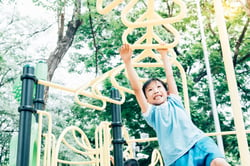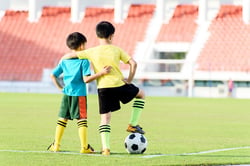This article is brought to you in collaboration with Child Development Unit (CDU), Khoo Teck Puat � National University Children�s Medical Institute, National University Hospital.
As adults, we may sometimes miss the carefree-ness of our childhood and youth. Is it really true that children are worry-free? Perhaps much less so than we think. We speak with Ms Cheryl Ong, Senior Psychologist and Ms Chiang Jing Jing, Senior Occupational Therapist at CDU.

What are the possible sources of stress and situations that challenge the resilience of children?
Without doubt, parents want to provide maximum protection over their kids and keep them from harm. Despite their best efforts, it is inevitable that children may experience varying sources of stress and worry.
-
At home, they may feel neglected by working parents, or when a younger sibling arrives and fights for attention, or when the family breaks apart as a result of divorce. In fact, children are not just affected when they are directly involved in incidents at home. What they witness can have a negative impact as well, such as being a witness to domestic violence or daily arguments.
-
In school, they may be pressured by increasingly difficult school subjects, or a need to outperform classmates academically or in sports.
-
Socially, they may be learning to get along and communicate with peers, through conflict and disagreement. Increased exposure to social media can also result in young children being more susceptible to cyber-bullying from a young age.

What are some parenting trends observed?
In recent years, 'helicopter parenting' is an area of concern. Some parents may misunderstand this as letting the child set their own limits and boundaries, sometimes ending up being too permissive and condoning of misbehaviour. Some parents may do anything to avoid their child's disagreement or disappointment, and do everything they can to keep their child happy or shield their child from challenges or failures that may lead to uncomfortable feelings.
On the other end of the scale, we see parents who are overly strict and engage in the 'tough love' approach. These parents often use physical punishment (e.g. hitting, caning) to maintain discipline, or use criticism and comparison as a way to encourage their child to perform better. This may signal to the child that they are never 'good enough'. Often, such parents tend to set too many expectations on their child, causing their child to feel helpless and increasingly reluctant to try.
A third group are the disengaged parents. When parents are too busy with their work and constantly on their smartphones, the child may inadvertently feel ignored or neglected, with communication limited to physical needs and learning (e.g. what did you eat/learn in school today?).
The above scenarios do not solve emotional or behavioural problems in our children. In some cases, it may mask the difficulties, or even exacerbate the problems.

Why is resilience building important in our kids� developmental years, and what should parents take note of?
We want our kids to have the ability to deal emotionally and mentally with challenges and tough times, enabling them to recover from setbacks and stay determined on their paths towards their goals in life.
How parents behave and view the education system certainly play a part in how our kids develop resilience. A �kiasu� mentality may be deeply ingrained in many parents, resulting in �helicopter� parents who hover excessively over their children to protect them from mistakes and setbacks. Children then lose the opportunity to build the �I can� coping skills that help to build resilience.
Another spin-off from the �kiasu� mentality could be an over-emphasis on academic excellence and outcomes. If parents resort to criticism and comparison, challenging the child's own self-worth, this affects the �I am� of resilience.
Finally, in the �I have� of building resilience, it is important for children to know that they have the support of adults to show them how to do things right and independently. It is also important for children to have an adult who loves them no matter what, and to have an adult who is available to help when they need help. Having a secure attachment with a responsive caregiver is one of the most protective factors in developing resilience.
To encourage independence, parents can also leave their children to solve their own problems, while being close by to guide them how to do things right.

At CDU, the team works with parents to develop a balanced approach towards setting age-appropriate limits and boundaries for their children, and enforcing them in a calm and consistent manner. Parents are also guided on how to be better aware of their children�s innate temperaments, and identify and regulate their emotions.
Additionally, CDU also recommends optimising play as a tool to boost our children�s resilience. Through play, our kids can:
-
Establish positive relationships, with peers, team mates and coaches.
-
Develop soft skills such as teamwork, managing conflict, accepting mistakes and losing, and more.
-
Spend quality time with family, as many activities can be enjoyed within the comfort of home or during quality family time together.

If you need ideas for what to do with your kids, check out Active Parents resources here.
- - -
Separately, MOE has these handy tips to share.

For more resources from MOE, check out:
- Social and emotional learning: Resources for parents
- Giving Our Children S.P.A.C.E. to Build Resilience
- - -
Related read:
Helping Your Kids Deal with Change and Stress





![ActiveSG Academies and Clubs Logo (Solid Colour)[8647]](https://www.activesgcircle.gov.sg/hs-fs/hubfs/ActiveSG%20Circle%202023Theme/images/ActiveSG%20Academies%20and%20Clubs%20Logo%20(Solid%20Colour)%5B8647%5D.png?width=150&height=65&name=ActiveSG%20Academies%20and%20Clubs%20Logo%20(Solid%20Colour)%5B8647%5D.png)



-01.png?width=200&height=141&name=Team%20Singapore%20Logo%20(Red)-01.png)












.jpg?width=250&height=250&name=CQ@Clarke%20Quay%20Poster.jpg%20(400x400px).jpg)
.png?width=250&height=250&name=CCE%2024%20April%20Coaching%20as%20a%20way%20of%20Life%20From%20(400%20x%20400%20px).png)

